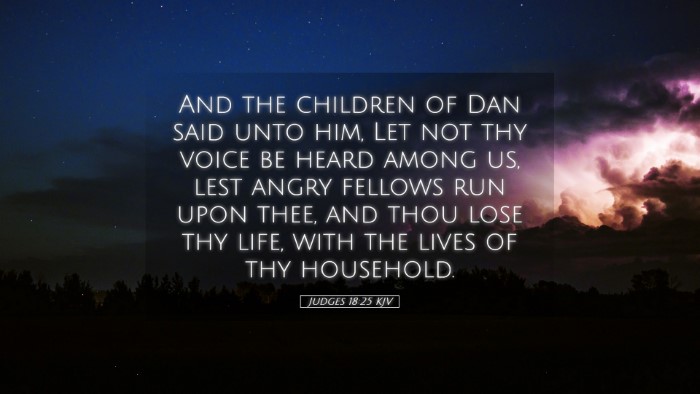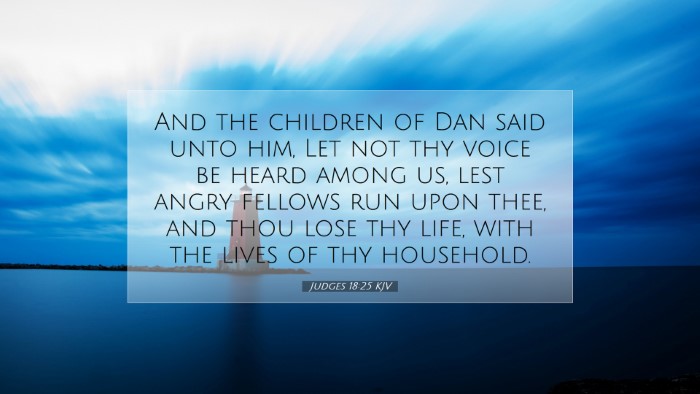Commentary on Judges 18:25
Verse: "And the children of Dan said unto him, Let not thy voice be heard among us, lest angry fellows run upon thee, and thou lose thy life, with the lives of thy household."
Contextual Overview
This verse is situated within the narrative of the Tribe of Dan's quest for territory, showcasing the dynamics of conflict, tribal identity, and the pursuit of peace. The narrative reveals the moral ambiguities surrounding the actions of the Danites, as they seek further land and establish themselves, often at the cost of others.
Insights from Matthew Henry
Matthew Henry emphasizes the significance of the response of the Danites. He interprets their words as an indication of the harsh realities of inter-tribal relations in Israel at that time. The statement "Let not thy voice be heard among us" reflects a caution against provoking violence, which illustrates how fragile peace can be in contentious environments. Henry points out that the danger of anger, illustrated here, serves as a warning for all believers to act prudently in their communications and interactions with others.
Henry also suggests that the Danites' ambition for territory should be taken with a measure of critical reflection. Their actions, while strategic, often lack ethical considerations. This prompts a deeper analysis of motivations underlying the pursuit of land and security, urging pastoral leaders to reflect on the moral implications of their pursuits amongst their congregations.
Insights from Albert Barnes
Albert Barnes highlights the gravity of the threat that the unnamed person faces, as expressed by the Danites. This verse illustrates the violent repercussions of vocal dissent within unstable communities. Barnes emphasizes that the Danites understood the potential for escalated conflict; they were aware that emotions could lead to hostile actions against them. This resonates with deeper theological implications regarding how believers must navigate complex social dynamics while upholding their values.
Additionally, Barnes reflects on the need for communal integrity, emphasizing that the well-being of individuals is intricately linked to the harmony of the community. For scholars and pastors, this serves as a reminder of the collective responsibility that all believers have to maintain peace and order, mirroring the calls for unity found throughout Scripture.
Insights from Adam Clarke
Adam Clarke delves into the historic and cultural implications of the verse. He draws attention to the significance of tribal affiliations and the fierce loyalty present among the tribes of Israel. Clarke suggests that the incident reflects a broader theme seen throughout Judges, where the quest for survival often overrides moral integrity. This is indicative of the overall narrative of the Book of Judges—a time marked by moral ambiguity and societal decline.
Clarke also poses questions about leadership and authority within community structures. The warnings given show a fragile balance between exercising authority and avoiding provocation. For pastors and church leaders, this highlights the importance of discerning leadership—understanding when to speak boldly and when to exercise restraint for the greater good.
Thematic Connections and Practical Applications
- Conflict Resolution: The verse provides a practical lens for understanding conflict within the church. It underscores the importance of communication and the need for restraint in discussions that can lead to anger and division.
- Caution in Leadership: The admonition of the Danites reflects the necessity of wise leadership in managing conflicts and controversial issues within congregational settings.
- Moral Ambiguity: Reflecting on the moral complexities the Danites faced, scholars are encouraged to explore the interplay of ambition, ethics, and divine guidance in decision-making.
- Community Integrity: The emphasis on communal responsibility serves as a powerful reminder that actions have consequences not only for the individual but for the entire community of believers.
Conclusion
Judges 18:25 encapsulates vital themes regarding conflict, ethics, and leadership. Drawing from the insights of Matthew Henry, Albert Barnes, and Adam Clarke provides a rich tapestry for understanding the societal and theological implications of this verse. For pastors, students, and scholars, such reflections invite a deeper engagement with the text, facilitating applications that resonate with contemporary church life and community dynamics.


